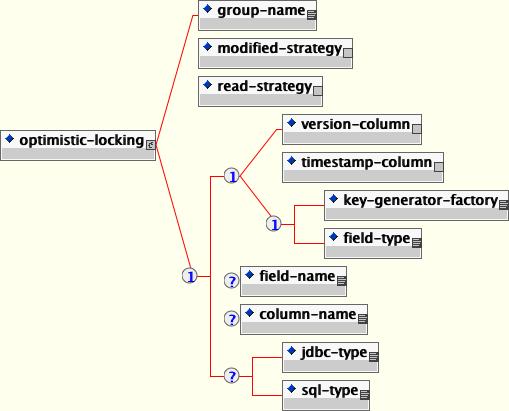JBoss has supports for optimistic locking of entity beans. Optimistic locking allows multiple instances of the same entity bean to be active simultaneously. Consistency is enforced based on the optimistic locking policy choice. The optimistic locking policy choice defines the set of fields that are used in the commit time write of modified data to the database. The optimistic consistency check asserts that the values of the chosen set of fields has the same values in the database as existed when the current transaction was started. This is done using a select for UPDATE WHERE ... statement that contains the value assertions.
You specify the optimistic locking policy choice using an optimistic-locking element in the jbosscmp-jdbc.xml descriptor. The content model of the optimistic-locking element is shown below and the description of the elements follows.
-
group-name : This element specifies that optimistic locking is based on the fields of a
load-group. This value of this element must match one of the entity'sload-group-name. The fields in this group will be used for optimistic locking. -
modified-strategy : This element specifies that optimistic locking is based on the modified fields. This strategy implies that the fields that were modified during transaction will be used for optimistic locking.
-
read-strategy : This element specifies that optimistic locking is based on the fields read. This strategy implies that the fields that were read/changed in the transaction will be used for optimistic locking.
-
version-column : This element specifies that optimistic locking is based on a version column strategy. Specifying this element will add an additional version field of type
java.lang.Longto the entity bean for optimistic locking. Each update of the entity will increase the value of this field. Thefield-nameelement allows for the specification of the name of the CMP field while thecolumn-nameelement allows for the specification of the corresponding table column. -
timestamp-column : This element specifies that optimistic locking is based on a timestamp column strategy. Specifying this element will add an additional version field of type
java.util.Dateto the entity bean for optimistic locking. Each update of the entity will set the value of this field to the current time. Thefield-nameelement allows for the specification of the name of the CMP field while thecolumn-nameelement allows for the specification of the corresponding table column. -
key-generator-factory : This element specifies that optimistic locking is based on key generation. The value of the element is the JNDI name of a
org.jboss.ejb.plugins.keygenerator.KeyGeneratorFactoryimplementation. Specifying this element will add an additional version field to the entity bean for optimistic locking. The type of the field must be specified via thefield-typeelement. Each update of the entity will update the key field by obtaining a new value from the key generator. Thefield-nameelement allows for the specification of the name of the CMP field while thecolumn-nameelement allows for the specification of the corresponding table column.
A sample jbosscmp-jdbc.xml descriptor illustrating all of the optimistic locking strategies is given below.
<!DOCTYPE jbosscmp-jdbc PUBLIC
"-//JBoss//DTD JBOSSCMP-JDBC 3.2//EN"
"http://www.jboss.org/j2ee/dtd/jbosscmp-jdbc_3_2.dtd">
<jbosscmp-jdbc>
<defaults>
<datasource>java:/DefaultDS</datasource>
<datasource-mapping>Hypersonic SQL</datasource-mapping>
</defaults>
<enterprise-beans>
<entity>
<ejb-name>EntityGroupLocking</ejb-name>
<create-table>true</create-table>
<remove-table>true</remove-table>
<table-name>entitygrouplocking</table-name>
<cmp-field>
<field-name>dateField</field-name>
</cmp-field>
<cmp-field>
<field-name>integerField</field-name>
</cmp-field>
<cmp-field>
<field-name>stringField</field-name>
</cmp-field>
<load-groups>
<load-group>
<load-group-name>string</load-group-name>
<field-name>stringField</field-name>
</load-group>
<load-group>
<load-group-name>all</load-group-name>
<field-name>stringField</field-name>
<field-name>dateField</field-name>
</load-group>
</load-groups>
<optimistic-locking>
<group-name>string</group-name>
</optimistic-locking>
</entity>
<entity>
<ejb-name>EntityModifiedLocking</ejb-name>
<create-table>true</create-table>
<remove-table>true</remove-table>
<table-name>entitymodifiedlocking</table-name>
<cmp-field>
<field-name>dateField</field-name>
</cmp-field>
<cmp-field>
<field-name>integerField</field-name>
</cmp-field>
<cmp-field>
<field-name>stringField</field-name>
</cmp-field>
<optimistic-locking>
<modified-strategy/>
</optimistic-locking>
</entity>
<entity>
<ejb-name>EntityReadLocking</ejb-name>
<create-table>true</create-table>
<remove-table>true</remove-table>
<table-name>entityreadlocking</table-name>
<cmp-field>
<field-name>dateField</field-name>
</cmp-field>
<cmp-field>
<field-name>integerField</field-name>
</cmp-field>
<cmp-field>
<field-name>stringField</field-name>
</cmp-field>
<optimistic-locking>
<read-strategy/>
</optimistic-locking>
</entity>
<entity>
<ejb-name>EntityVersionLocking</ejb-name>
<create-table>true</create-table>
<remove-table>true</remove-table>
<table-name>entityversionlocking</table-name>
<cmp-field>
<field-name>dateField</field-name>
</cmp-field>
<cmp-field>
<field-name>integerField</field-name>
</cmp-field>
<cmp-field>
<field-name>stringField</field-name>
</cmp-field>
<optimistic-locking>
<version-column/>
<field-name>versionField</field-name>
<column-name>ol_version</column-name>
<jdbc-type>INTEGER</jdbc-type>
<sql-type>INTEGER(5)</sql-type>
</optimistic-locking>
</entity>
<entity>
<ejb-name>EntityTimestampLocking</ejb-name>
<create-table>true</create-table>
<remove-table>true</remove-table>
<table-name>entitytimestamplocking</table-name>
<cmp-field>
<field-name>dateField</field-name>
</cmp-field>
<cmp-field>
<field-name>integerField</field-name>
</cmp-field>
<cmp-field>
<field-name>stringField</field-name>
</cmp-field>
<optimistic-locking>
<timestamp-column/>
<field-name>versionField</field-name>
<column-name>ol_timestamp</column-name>
<jdbc-type>TIMESTAMP</jdbc-type>
<sql-type>DATETIME</sql-type>
</optimistic-locking>
</entity>
<entity>
<ejb-name>EntityKeyGeneratorLocking</ejb-name>
<create-table>true</create-table>
<remove-table>true</remove-table>
<table-name>entitykeygenlocking</table-name>
<cmp-field>
<field-name>dateField</field-name>
</cmp-field>
<cmp-field>
<field-name>integerField</field-name>
</cmp-field>
<cmp-field>
<field-name>stringField</field-name>
</cmp-field>
<optimistic-locking>
<key-generator-factory>UUIDKeyGeneratorFactory</key-generator-factory>
<field-type>java.lang.String</field-type>
<field-name>uuidField</field-name>
<column-name>ol_uuid</column-name>
<jdbc-type>VARCHAR</jdbc-type>
<sql-type>VARCHAR(32)</sql-type>
</optimistic-locking>
</entity>
</enterprise-beans>
</jbosscmp-jdbc>
